World Wars
Ever since World Music emerged as a useful marketing concept back in 1987, conspiracy theorists wasted energies on criticising it. ‘Enough!’ said Ian Anderson …
(First published in fRoots 201, March 2000)
In the New York Times last October, rock star David Byrne penned a feature titled Why I Hate World Music. “In my experience, the use of the term world music is a way of dismissing artists or their music as irrelevant to one’s own life,” he avowed. “It’s a way of relegating this ‘thing’ into the realm of something exotic and therefore cute, weird but safe, because exotica is beautiful but irrelevant; they are, by definition, not like us… It groups everything and anything that isn’t ‘us’ into ‘them.’ This grouping is a convenient way of not seeing a band or artist as a creative individual, albeit from a culture somewhat different from that seen on American television. It’s a label for anything at all that is not sung in English or anything that doesn’t fit into the Anglo-Western pop universe this year.”
Well, that’s David Byrne’s little local problem, but it is one that has occasionally raised its head among conspiracy theorists ever since the summer of 1987 when the original World Music campaign kicked in. Indeed, hardly had the first press releases settled on journalists’ desks when London’s City Limits magazine ran a knee-jerk featurette penned by Rick Glanville under the heading Bullshit Detector. “Anybody from the Third World is allowed to join through the paternalistic assumption of rudimentary, exotic and inaccessible qualities. What the punter-friendly moniker fails to do is sidestep the middle class white dominance which spawned it – Folk Roots magazine has tenaciously trumpeted acts like the Bhundu Boys and Youssou N’Dour when such hi-tech contemporary synth bands have never worn an Aran jumper in their lives.”
Most of that says a lot more about the prejudices of the accuser than it does about the subject itself. In Britain, anything done out of enthusiasm by somebody with the slightest whiff of middle-classedness about them is automatically cause for intense suspicion. If such enthusiastic middle-class activists happen to be white and male too then it’s an automatic conviction and throw away the key. Oddly, many of the people who hold these views are white, male and inescapably middle class too. Similarly, across the Atlantic there is a type of American who views anything done by those nasty ex-colonialist Brits (excluding, of course, the poor down-trodden Celts) as bound to be reprehensible. Of course, they then get very jumpy if we mention Coca Cola, cultural colonialism and the CIA …

How did we get to that point in now ancient history? Well, looking at it from personal experience, back in the 1960s it was very hard to find anything in England which wasn’t American or a local copy of it (that’ll teach those ex-colonialists, eh?). In turn, jazz, folk and blues (and later reggae) each had a boom, establishing such sufficiently sizeable niches that you would henceforth find their sections in most record shops. What might actually be put in those sections never needed to be fully defined, not that anybody ever could. The important thing was that you gut-feeling knew what jazz or folk was, even if it wasn’t the same gut-feeling as the next person had. If you thought that was what you liked, then you knew where there might be a chance of finding it. Record shop staff could take a reasonable shot at which box to drop an LP sleeve into. So the stuff sold to the fans who wanted to buy it, and the curious beginner had somewhere to browse.
As I wasn’t too bright or motivated, I didn’t go to university and thus grew a deep mistrust of people who used terms like ‘ethnomusicology’ and ‘anthropology’. But there were other underground routes to worldly delights. The American magazine Sing Out! was one. I first heard Bai Konte’s kora on one of their flexi-discs in the ’70s, little imagining that I’d one day visit his home and work with his son. At the beginning of the ‘80s things gradually started to get better. The information revolution was growing and the world was getting smaller. Not long after this magazine started up, there was another short-lived but vital publication called Collusion, edited by David Toop, Sue Steward and Steve Beresford. Like Blues Unlimited in the ’60s it brought the wonderful realisation that there were other like-questing minds out there, sources for import records – Ali Farka Toure, Les Ambassadeurs, holy shit! – and information.
In what now seems a relatively short time there came King Sunny Ade, Youssou N’Dour and Thomas Mapfumo to play live before our very eyes, GLC shows, gigs in the park behind behind the Commonwealth Institute, Arts Worldwide events and Womad, Earthworks, GlobeStyle and Stern’s. Alexis Korner, ever broadminded, would play Okinawan records on the radio, Charlie Gillett and Andy Kershaw soon became converts to international sounds, and the 3 Mustaphas 3 popped up on John Peel. Our magazine was able to review more and more records because they were now becoming available on local release or import, and artists came here so we could talk to them. My own little record label emerged at the beginning of the ’80s with a minor hit by Bulgaria’s Nadka Karadjova (entirely, it must be said, because of concentrated novelty airplay by Terry Wogan) and the far more hip indie label 4AD had a mammoth seller with Les Mysteres De Voix Bulgares. But where the hell did you look in your High Street record shop for all this varied music that now had a burgeoning would-be buyer base but no obvious rack to browse?
It was Roger Armstrong and Ben Mandelson from GlobeStyle who called the fateful meeting. For some reason I’ve kept all the minutes (you can find them on the fRoots web site . At 7.00pm on Monday June 29th, 1987,
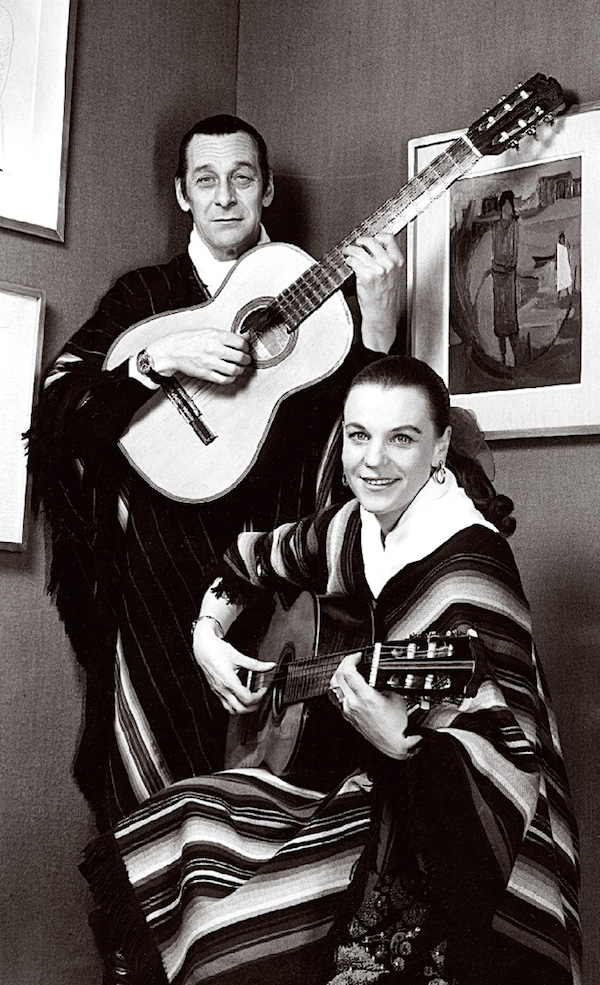
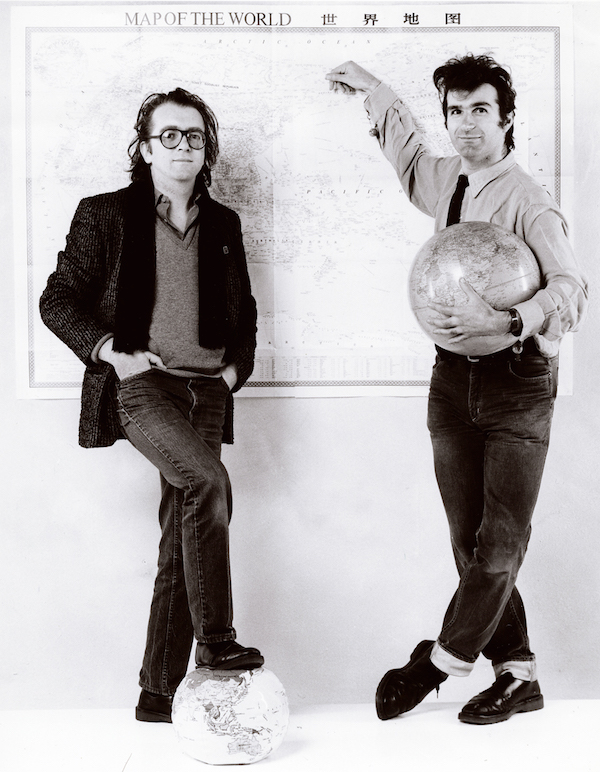
It wasn’t a new name, just one of many that had floated around in the preceding decades. But the logic set out by Roger Armstrong was that an established, unified generic name would give retailers a place where they could confidently rack otherwise unstockable releases, and where customers might both search out items they’d heard on the radio (not knowing how to spell a mis-pronounced or mis-remembered name or title) and browse through wider catalogue. Various titles were discussed including ‘Worldbeat’ (left out anything without drums), ‘Tropical’ (bye bye Bulgarians), ‘Ethnic’ (boring and academic), ‘International Pop’ (the death-by-Johnny-and-Nana syndrome) and ‘Roots’ (left out Johnny and Nana). ‘World Music’ seemed to include the most and omit the least, and got it on a show of hands. Nobody thought of defining it or pretending there was such a beast: it was just to be a box, like jazz, classical or rock …
The plot progressed quickly during that summer. The princely sum of £3500 was contributed by the participants, headed browser dividers were manufactured for distribution to shops along with a co-operative starter

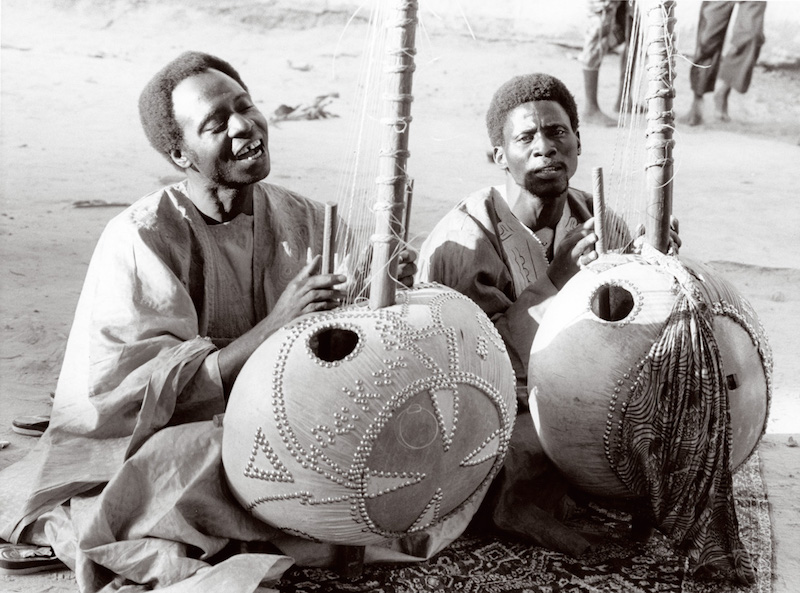
Of course, being older and, if not wiser, having the benefit of hindsight, one can see that having such a simple concept without any baggage was still likely to bring problems. Even if the original idea was virus-free, it was bound to get thoroughly bugged as others logged on.
In minority musics as in political parties, people will always invent conspiracies and low motives where none exist (the enthusiastic activist must have a sub-plot, mustn’t they?) But just try explaining the role of the enthusiast to a musician from a poor third world country where the very notion is alien. I remember an in-law of mine from Madagascar bursting into tears when, having finally grasped the totally unknown concept of ‘a hobby’, she also realised that this notion involving spare time was a supreme luxury even further beyond her grasp than mere material possessions.
The racism issue is always hard to deal with. At an unruly public discussion held in the mid ’80s, a group of Arts Council funded UK-based African musicians declared that the reason they had to search for their own gigs and self-produce their albums was that they were black in a white society. I pointed out that virtually all white English folk musicians had to do the same thing, without any grant aid, but that if at the end of the day there were no gigs coming in we had to face up to the fact that maybe people didn’t think our music was any good. The guys in that band never needed to deal with that concept as they could always use the racism excuse. Needless to say, it wasn’t a well-received message.
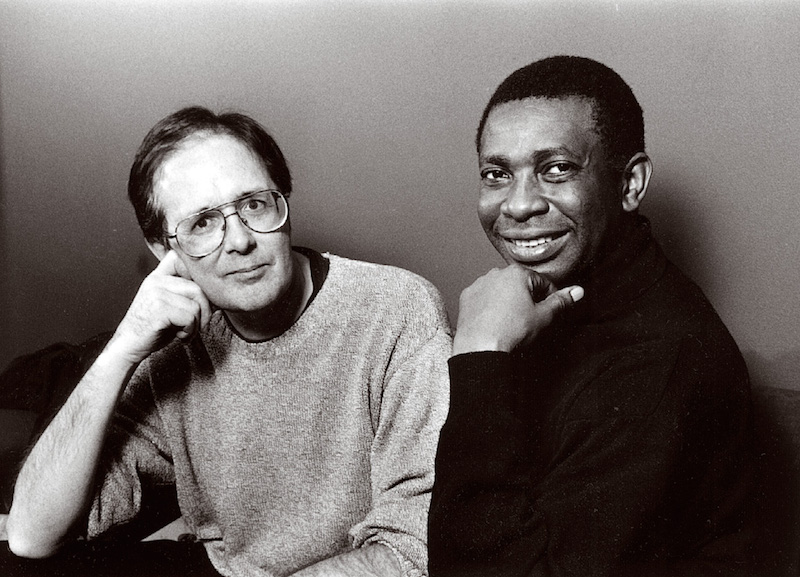
That latter kind of reaction to world music artists is part of yet another set of problems heaped on this genre that doesn’t exist other than as a box in a record shop.
Angelique Kidjo complains in her introduction to the recent Music Hound World book that “Critics generally want a musician from a foreign country to stick to a pure tradition; he has to be ‘authentic’.” Well, there are ‘purists’ and ‘traditionalists’ in just about every form of music. But it was never part of the original World Music concept to tell artists what to do, just to help them sell records. There’s no rules to stop Kidjo or Youssou N’Dour or Zap Mama if they want to make music that they or the buyers may feel fits better in a different box, or no box at all. If they move into a genre that thousands of other artists are already involved in, perhaps as a route to ‘crossover’ success, it’s their choice. It is perhaps more likely to be their loss of uniqueness rather than ‘authenticity’ – there may be many other artists already in that field who do it better – that loses fans. If the recording artist has the right to make whatever music they like, the potential buyer also has the right to buy what they like – or not.
Sub-cultures of World Music fans even go through internecine attitude struggles. When I started to get this magazine up to speed with its coverage of what-was-yet-to-be-called World Music in the early ‘80s, many noses were looked down by other people who were already involved, or perhaps entering from the jazz direction, at the thought of these dreadfully embarrassing uncool folkies getting interested. It took quite a while to undo those prejudices (some of the very people who were later at that inaugural meeting took some convincing, I can tell you…) and it goes on in other quarters to this day. Yes, there are some out there who don’t like the term World Music simply because – as it has been consistently championed by the likes of fRoots – they still make imagined Aran sweatery connotations. Twerps …
At the end of World Music Year Zero, 1987, I went to the best ever gig of my whole life – Youssou N’Dour in the stadium at Ziguinchor, Casamance, Senegal. Later that night, we sat talking at Youssou’s hotel and another English person in the party told him how he hoped Youssou wouldn’t go the route of Salif Keita’s then-recent Soro album, which the Englishman considered ‘Westernised’ as it was full of synthesizers. Youssou politely, gentlemanly, put the guy in his place, saying that instruments don’t have a nationality, only musicians, and that if a Senegalese musician played a synthesizer or an electric guitar, it became a Senegalese instrument. Recently I was able to talk with Youssou again about Western attitudes to this music (he reconfirmed his 1987 belief) and whether he saw a difference between how the Americans, the British and the French approach things.
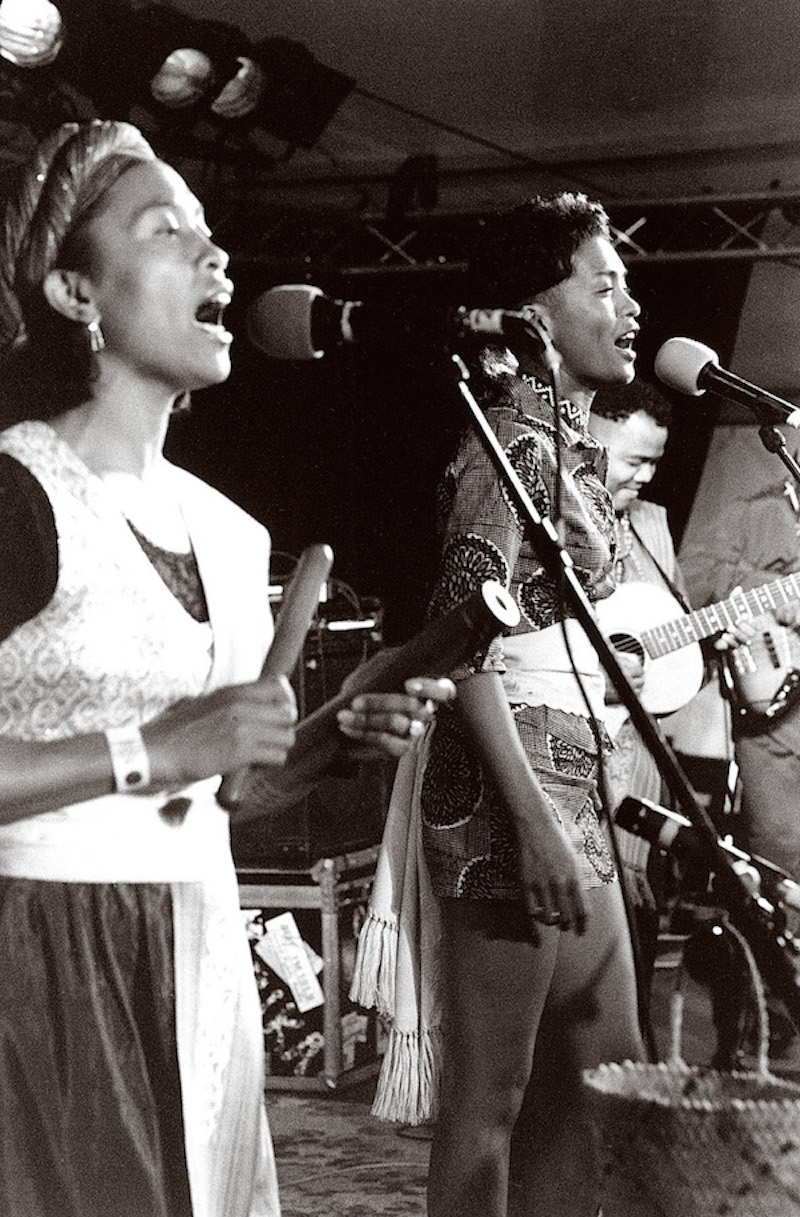
Madagascar’s Tarika have an affectionate term for those genuinely friendly, determined-to-bond Americans who show up backstage in all-purpose colourful robes and world music hats. They call them “professional Africans”. And when Tarika first started touring in the USA, their pals from the Mustaphas told them that when people in diners or on the street asked where they came from, all they needed to say was “out of town” and the enquirer would be completely satisfied with the answer. It turned out to be absolutely true. I once read and have now forgotten the percentage of US citizens who own a passport, and it was startlingly low. That is probably why an American journalist on a conference panel once avowed that it was a lot easier for Europeans to hear World Music because we lived so much closer to it, and it’s surely this rather than a box called World Music which explains why the most common adjective that crops up in Tarika’s US press cuttings is “exotic”.
Of course none of the above applies to David Byrne, who is a sophisticated, educated, world-travelling artist, runs a label that has put out some fine international ethnic tropical worldbeat records, and rose above all that long ago. However, it maybe explains why he imagines everybody else categorises World Music in that way he doesn’t like. But mostly they don’t. Not outside his native USA, anyway, and I’m not even sure it’s so universally true there. People just find it a useful box, all that was originally intended. They certainly put records in it that neither you, I, the original plotters or David Byrne alike would ever dream of including – have you seen what Billboard includes on their World Music chart? – but it still serves its original great purpose.
It’s not all positive, but World Music (or Musique du Monde in neighbourly Paris) is way ahead on points. It sells large quantities of records that you couldn’t find for love or money two decades ago. It has let many musicians in quite poor countries get new respect (and houses, cars and food for their families), and it turns out massive audiences for festivals and concerts. It has greatly helped international understanding and provoked cultural exchanges – people who’ve found themselves neighbours in the same box have listened to each other and ended up making amazing music together. Oh, and it has allowed a motley bunch of enthusiasts to not yet need to get proper jobs. I call it a Good Thing, and just feel a bit sorry for people with the thinking time on their hands to decide they hate World Music … Lighten up, guys, it’s only a box in a record shop.
Shop
You can buy CDs and downloads at our online shop.
Writing
Technology (2002)
Photographers (2002)
English Country Dance Music (2003)
Is That All There Is? (2005)
Self Worth (2007)
Television (2008)
Musical Racism (2008)
Small Venues & the Folkistanis (2009)
Existential Stuff Crisis (2013)
Festival Challenge (2014)